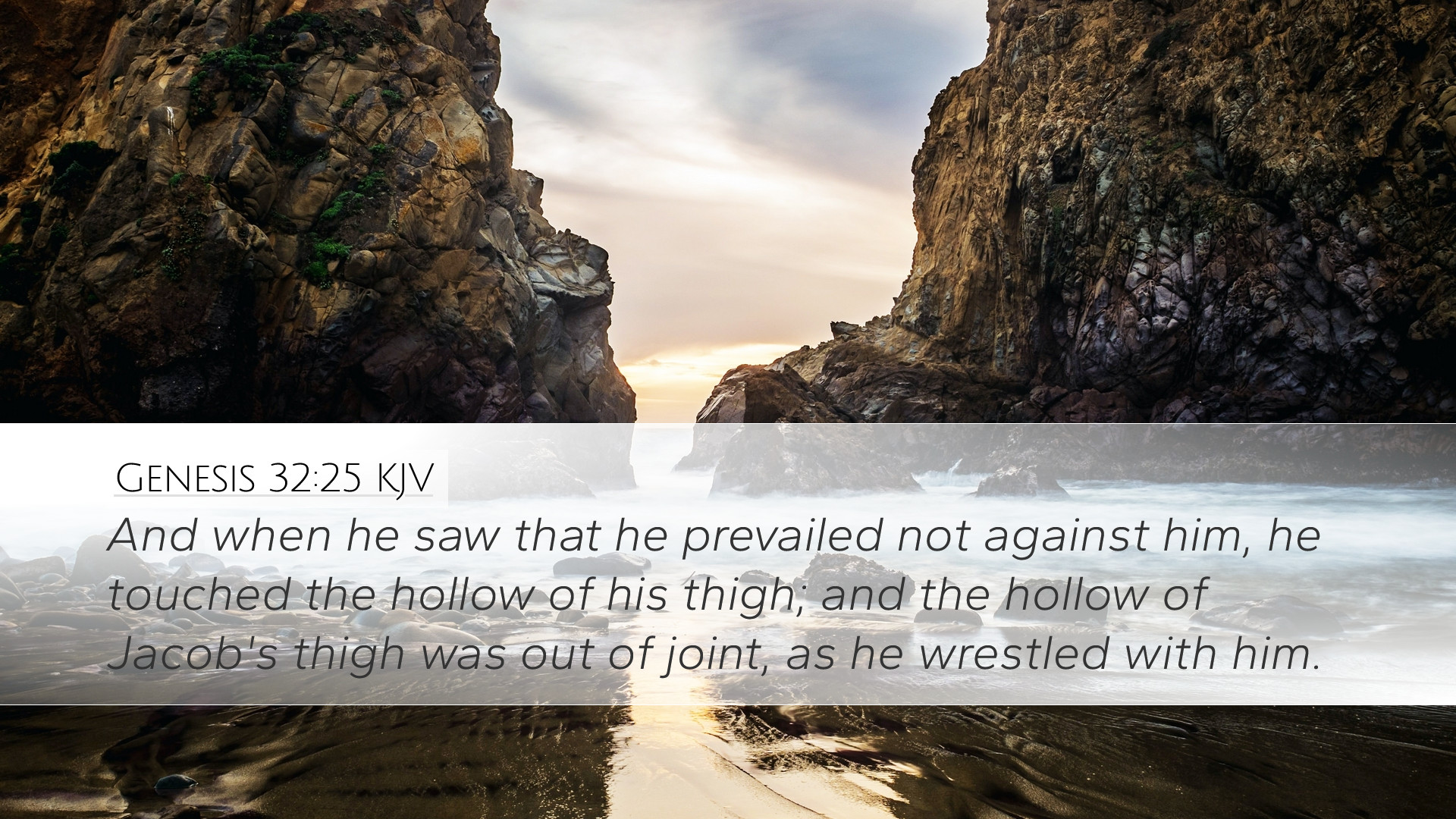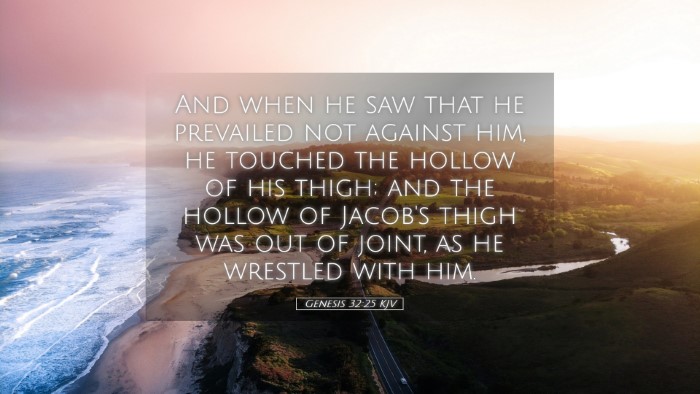Commentary on Genesis 32:25
Genesis 32:25 states: "And when he saw that he prevailed not against him, he touched the hollow of his thigh; and the hollow of Jacob's thigh was out of joint, as he wrestled with him."
This verse captures a significant moment of transformation for Jacob. The context reveals the struggle Jacob experienced as he prepared to face Esau, his estranged brother. This event of wrestling serves as a pivotal point in Jacob's life, suggesting deep spiritual and physical ramifications.
Insights from Matthew Henry
Matthew Henry remarks on the significance of Jacob's wrestling with the angel. He points out that this struggle occurs at a critical juncture in Jacob’s life where he faces the imminent threat of confrontation with Esau. Henry emphasizes that Jacob was not merely wrestling physically, but he was also engaging in a deeply spiritual battle.
- Spiritual Significance: Henry notes that Jacob's wrestling with God symbolizes a struggle to receive God's blessing, indicating that earnest prayer and earnest seeking often involve struggle.
- Divine Intervention: The angel’s inability to prevail against Jacob speaks to the tenacious nature of Jacob's faith. Henry suggests this underscores a theme that God rewards persistent faith.
- Physical Consequence: The injury to Jacob's thigh is both a mark of divine encounter and a reminder of his vulnerability. Henry points out that this injury does not render Jacob weaker but rather identifies his reliance on God.
Insights from Albert Barnes
Albert Barnes emphasizes the duality of this encounter, illustrating both the physical and spiritual dimensions of Jacob's wrestling with the angel of the Lord. He highlights that Jacob's struggle represents the human condition of grappling with faith and divine will.
- Symbol of Struggle: Barnes draws attention to the fact that the act of wrestling itself is emblematic of the struggles that believers face in life, especially when seeking divine favor.
- Thigh's Dislocation: The dislocation serves as a physical manifestation of the spiritual reality that Jacob must rely on God’s grace. He notes that this injury serves to humble Jacob, reminding him of his dependencies.
- New Identity: Barnes also reflects on the change of Jacob’s name later in the chapter. He posits that this change is a direct result of Jacob's persistence in prayer and struggle. Jacob becomes Israel, a name signifying one who has wrestled with God and overcome.
Insights from Adam Clarke
Adam Clarke provides a detailed examination of the cultural and theological background behind this verse. He underscores that the act of touching Jacob's thigh carries significant meaning within the ancient Near Eastern context.
- Cultural Context: Clarke notes that the hip is considered a vulnerable part of the body, and its dislocation signifies a profound defeat in the wrestling match which ultimately also represents Jacob’s drawing near to God.
- Transformation through Struggle: He asserts that Jacob’s wrestling illustrates the transformative power of struggle. Through this encounter, Jacob is refined and purged, enabling him to become the patriarch of a new nation.
- Theological Implications: Clarke emphasizes that this event foreshadows the broader narrative of Israel’s struggles with God throughout their history, highlighting themes of persistence, divine grace, and identity.
Theological Reflection
The wrestling match serves as a profound metaphor for the believer's relationship with God. It suggests that engagement with the divine often requires grappling with our own insecurities, fears, and questions. The passage calls to mind the importance of persistence in prayer, echoing the New Testament's message about not losing heart (Luke 18:1).
In this light, Jacob's encounter serves to remind believers that even in their most vulnerable states, God meets them. The physical injury Jacob sustains becomes a lasting testament to the encounter, a reminder that one's deepest struggles may become the very ground of transformation and blessing.
Application for Pastors and Theologians
- Encouragement to Struggle: Pastors can use this passage to encourage their congregations not to shy away from spiritual struggles, framing them as opportunities for divine encounters and growth.
- Understanding Vulnerability: The injury Jacob suffers allows for a discussion on human vulnerability and dependence on divine strength, especially useful in pastoral counseling settings.
- Identity in Christ: This narrative parallels New Testament teachings on identity; as believers wrestle with God, they, too, can emerge with new identities shaped by grace through faith.
Conclusion
Genesis 32:25 resonates with profound insights into the nature of faith, struggle, and transformation. The commentaries of Matthew Henry, Albert Barnes, and Adam Clarke collectively elucidate that wrestling with God is not an act of rebellion but a means of encountering the divine. This verse invites reflection on the believer's journey, encouraging an understanding that through struggle, one may attain deeper communion with God and a clearer sense of identity.


